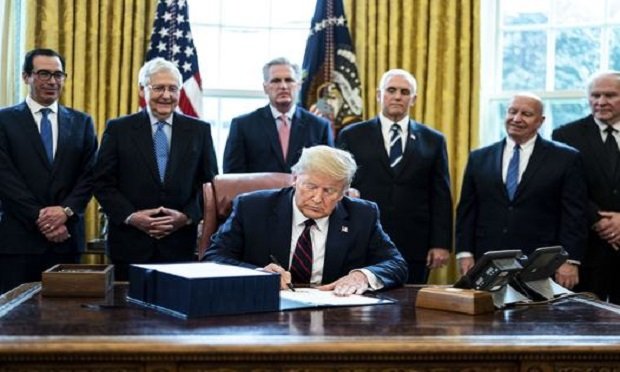 U.S. President Donald Trump signs the H.R. 748, Coronavirus Aid, Relief, and Economic Security (CARES) Act, in the Oval Office of the White House in Washington, D.C., U.S., on Friday, March 27, 2020. Trump signed the largest stimulus package in U.S. history today, a $2 trillion bill intended to rescue the coronavirus-battered economy after the House approved it earlier. (Photo: Erin Schaff/The New York Times/Bloomberg)
U.S. President Donald Trump signs the H.R. 748, Coronavirus Aid, Relief, and Economic Security (CARES) Act, in the Oval Office of the White House in Washington, D.C., U.S., on Friday, March 27, 2020. Trump signed the largest stimulus package in U.S. history today, a $2 trillion bill intended to rescue the coronavirus-battered economy after the House approved it earlier. (Photo: Erin Schaff/The New York Times/Bloomberg)
The recently passed Coronavirus Aid, Relief and Economic Stimulus Act (CARES Act) establishes several new avenues for businesses to combat the financial repercussions of the COVID-19 crisis. Among other things, it creates unique loan programs for small and midsize businesses and extends unusual tax benefits as an incentive for businesses to keep employees on the payroll.
Recommended For You
Want to continue reading?
Become a Free PropertyCasualty360 Digital Reader
Your access to unlimited PropertyCasualty360 content isn’t changing.
Once you are an ALM digital member, you’ll receive:
- Breaking insurance news and analysis, on-site and via our newsletters and custom alerts
- Weekly Insurance Speak podcast featuring exclusive interviews with industry leaders
- Educational webcasts, white papers, and ebooks from industry thought leaders
- Critical converage of the employee benefits and financial advisory markets on our other ALM sites, BenefitsPRO and ThinkAdvisor
Already have an account? Sign In Now

